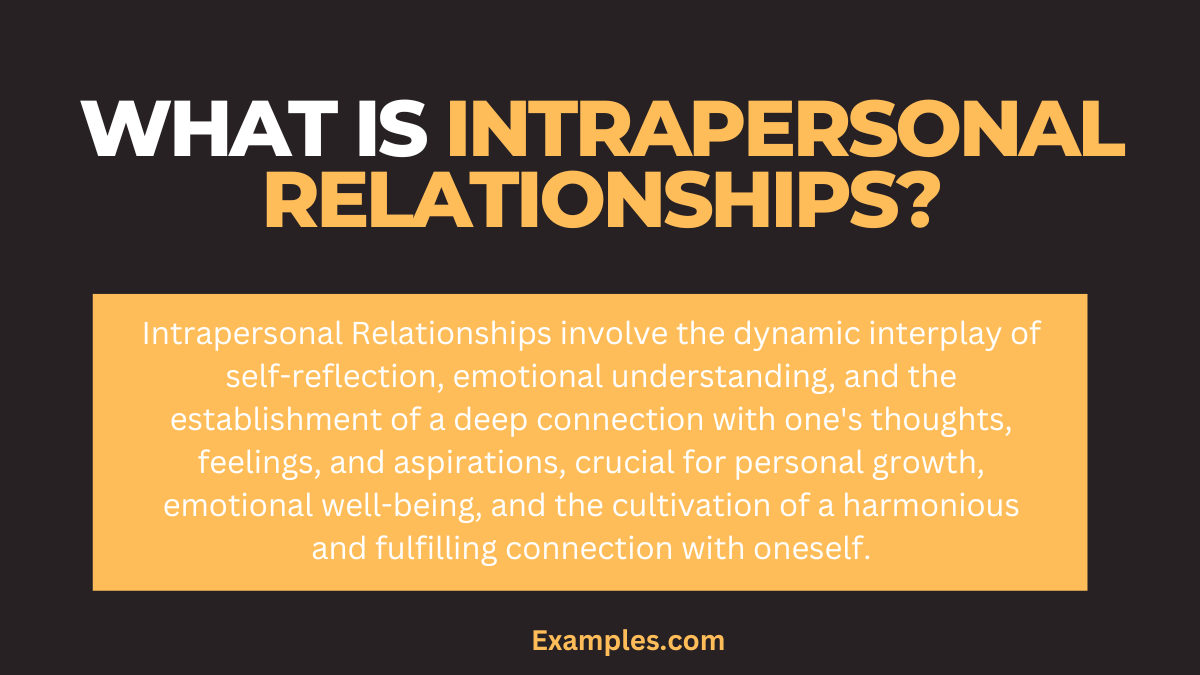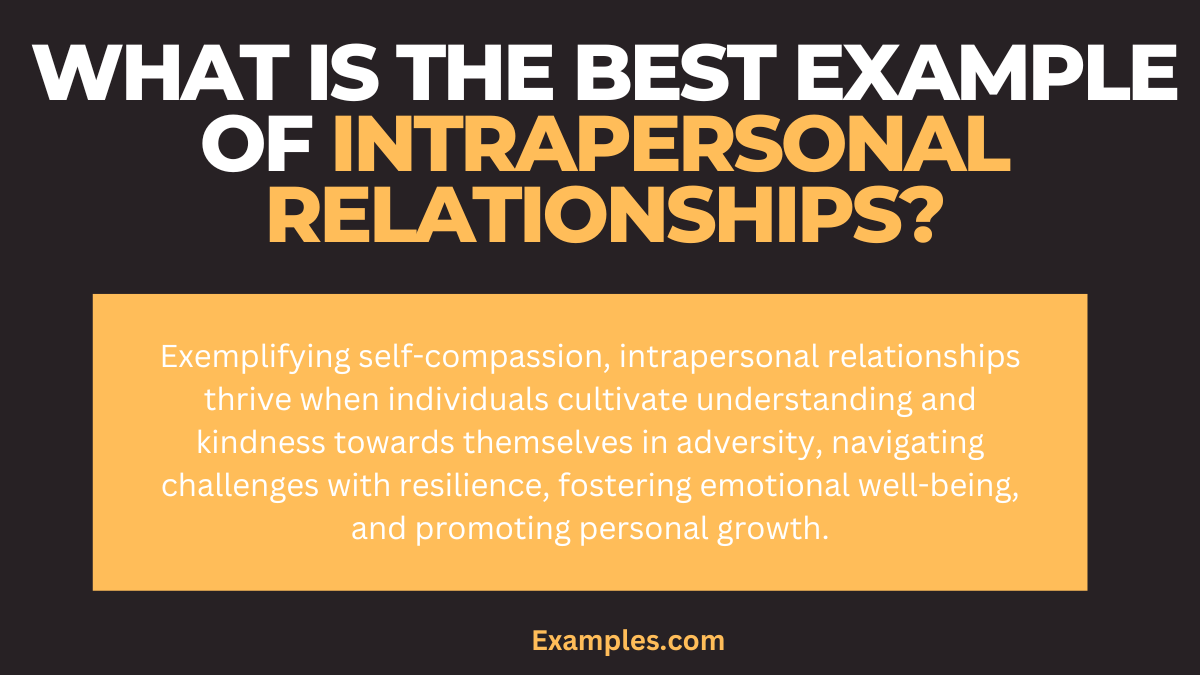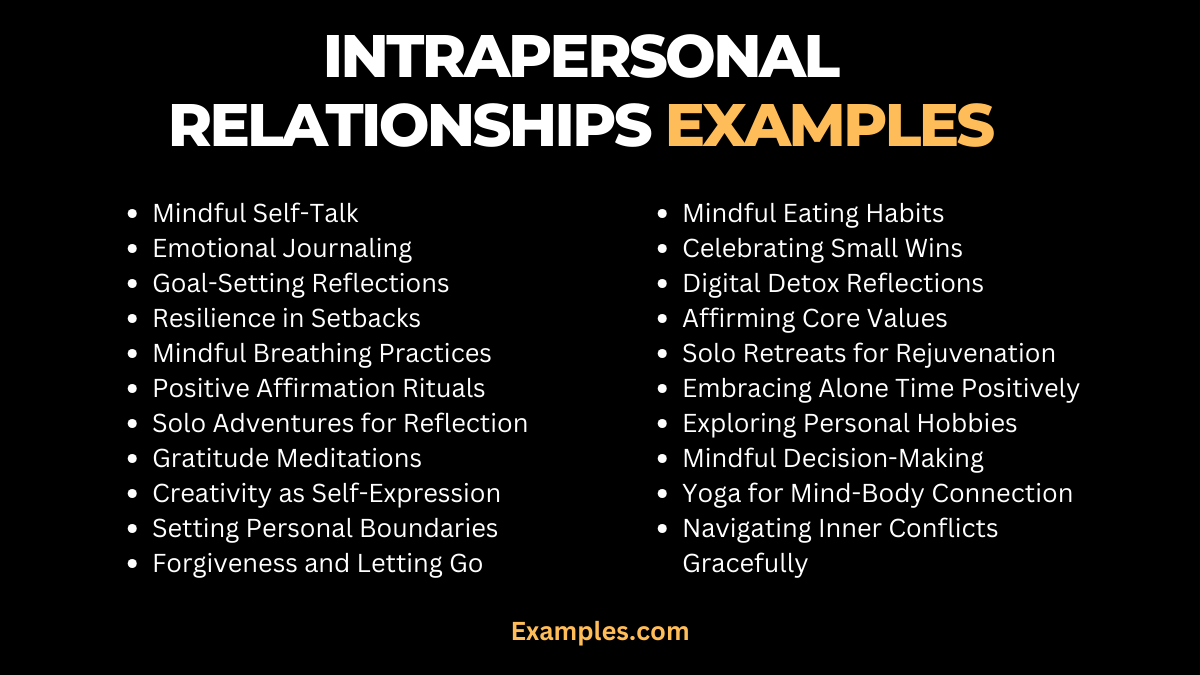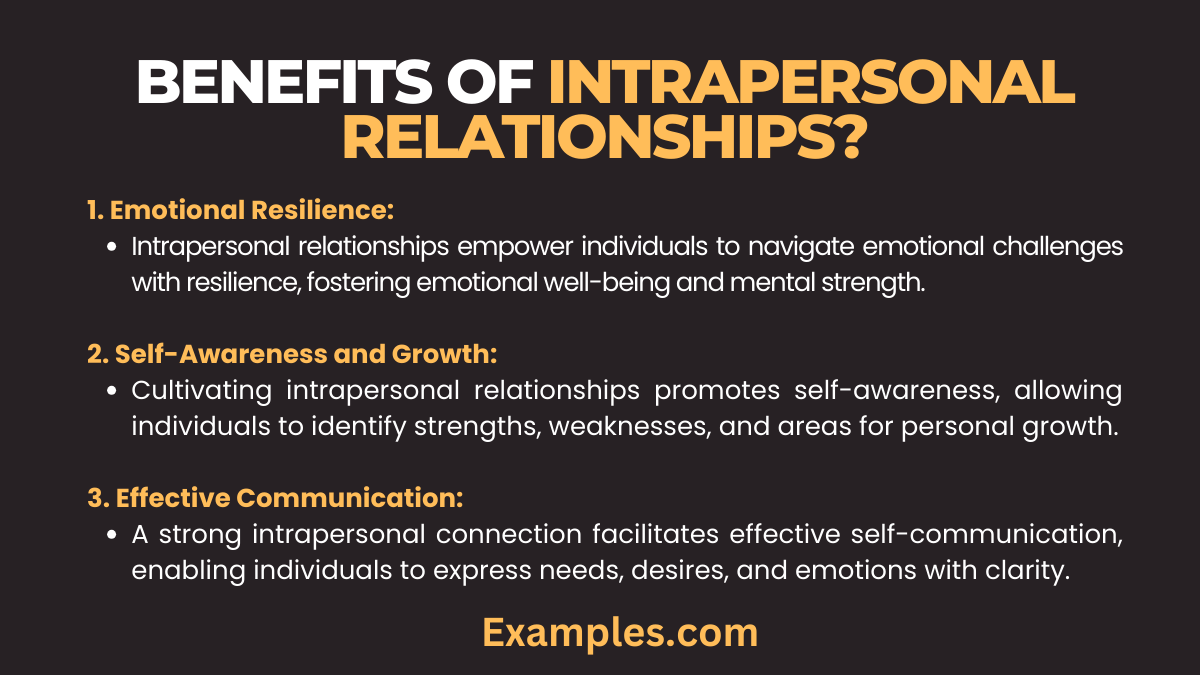24+ Intrapersonal Relationships Examples
Embark on a transformative journey with our comprehensive guide to Intrapersonal Relationships. Dive into nuanced examples, practical tips, and insightful insights to foster deep self-connection. This guide goes beyond the surface, emphasizing the importance of Communication Examples within intrapersonal realms. Discover the art of meaningful self-communication, unlocking personal growth, emotional intelligence, and a more fulfilling life journey. Explore the boundless possibilities of enhancing your relationship with yourself in this all-encompassing guide.
What is Intrapersonal Relationships?
 Intrapersonal Relationships refer to the dynamic and interconnected way individuals engage with themselves internally. This involves self-reflection, emotional understanding, and the development of a deep and meaningful connection with one’s own thoughts, feelings, and aspirations. Cultivating positive intrapersonal relationships is essential for personal growth, emotional well-being, and fostering a harmonious and fulfilling connection with oneself.
Intrapersonal Relationships refer to the dynamic and interconnected way individuals engage with themselves internally. This involves self-reflection, emotional understanding, and the development of a deep and meaningful connection with one’s own thoughts, feelings, and aspirations. Cultivating positive intrapersonal relationships is essential for personal growth, emotional well-being, and fostering a harmonious and fulfilling connection with oneself.
What is the Best Example of Intrapersonal Relationships?
 Intrapersonal Relationships shine in the exemplary case of self-compassion during adversity. This involves an individual cultivating a compassionate and understanding connection with themselves in challenging times. Through self-reflection, acknowledging emotions without judgment, and offering kindness, the person navigates adversity with resilience. This profound example exemplifies the ability to foster a positive, supportive, and compassionate intrapersonal relationship, promoting emotional well-being and personal growth in the face of challenges.
Intrapersonal Relationships shine in the exemplary case of self-compassion during adversity. This involves an individual cultivating a compassionate and understanding connection with themselves in challenging times. Through self-reflection, acknowledging emotions without judgment, and offering kindness, the person navigates adversity with resilience. This profound example exemplifies the ability to foster a positive, supportive, and compassionate intrapersonal relationship, promoting emotional well-being and personal growth in the face of challenges.
25 Intrapersonal Relationships Examples
 Explore 25 diverse examples of Intrapersonal Relationships, unveiling the multifaceted ways individuals can foster a deep connection with themselves. This guide provides insights into self-communication, emotional intelligence, and personal growth.
Explore 25 diverse examples of Intrapersonal Relationships, unveiling the multifaceted ways individuals can foster a deep connection with themselves. This guide provides insights into self-communication, emotional intelligence, and personal growth.
- Mindful Self-Talk: Practice mindful self-talk, fostering positive and affirming inner dialogue for enhanced self-esteem and motivation.
- Emotional Journaling: Engage in emotional journaling, expressing feelings to cultivate self-awareness and emotional regulation.
- Goal-Setting Reflections: Reflect on goal-setting achievements, acknowledging accomplishments and aligning future goals with personal values.
- Resilience in Setbacks: Navigate setbacks with resilience, viewing challenges as opportunities for learning and growth.
- Mindful Breathing Practices: Incorporate mindful breathing practices to center oneself and manage stress in daily life.
- Positive Affirmation Rituals: Establish positive affirmation rituals, reinforcing self-worth and cultivating a positive mindset.
- Solo Adventures for Reflection: Embark on solo adventures for reflection, providing time for introspection and self-discovery.
- Gratitude Meditations: Practice gratitude meditations, fostering appreciation for oneself and life’s positive aspects.
- Creativity as Self-Expression: Use creativity as a form of self-expression, exploring artistic outlets for emotional release.
- Setting Personal Boundaries: Set and communicate personal boundaries, promoting self-respect and healthy relationships.
- Forgiveness and Letting Go: Practice forgiveness, letting go of past grievances to foster inner peace and emotional freedom.
- Mindful Eating Habits: Cultivate mindful eating habits, promoting a healthy relationship with food and one’s body.
- Celebrating Small Wins: Celebrate small wins, recognizing achievements no matter how minor for positive reinforcement.
- Digital Detox Reflections: Reflect on the impact of a digital detox, fostering connection with oneself away from screens.
- Affirming Core Values: Affirm core values regularly, aligning actions with personal beliefs for authenticity.
- Solo Retreats for Rejuvenation: Plan solo retreats for rejuvenation, offering solitude and self-renewal.
- Embracing Alone Time Positively: Embrace alone time positively, viewing it as an opportunity for self-reflection and personal recharge.
- Exploring Personal Hobbies: Engage in personal hobbies, providing a joyful outlet for self-expression and creativity.
- Mindful Decision-Making: Approach decision-making mindfully, considering personal values and long-term impact.
- Yoga for Mind-Body Connection: Practice yoga for mind-body connection, enhancing physical and mental well-being.
- Navigating Inner Conflicts Gracefully: Navigate inner conflicts gracefully, using self-compassion and understanding for resolution.
- Reflection on Personal Growth: Regularly reflect on personal growth, acknowledging progress and areas for development.
- Setting Digital Boundaries: Set boundaries for digital consumption, promoting a balanced and intentional relationship with technology.
- Prioritizing Self-Care Practices: Prioritize self-care practices, ensuring physical and mental well-being as a top priority.
- Silent Contemplation Exercises: Engage in silent contemplation exercises, fostering a connection with inner thoughts and feelings.
Intrapersonal Relationships for Students Examples
Discover the impact of Intrapersonal Relationships on student well-being and academic success. This guide explores examples tailored to students, promoting self-discovery, emotional intelligence, and effective self-communication.
- Reflective Learning Journals: Maintain reflective learning journals, aiding students in processing emotions and tracking personal growth.
- Goal-Setting Workshops: Conduct goal-setting workshops, empowering students to align academic aspirations with personal values.
- Mindfulness in Study Sessions: Incorporate mindfulness in study sessions, fostering focus and emotional regulation for enhanced learning experiences.
- Peer Mentoring for Self-Reflection: Introduce peer mentoring programs to encourage self-reflection and growth through constructive feedback.
- Digital Detox Challenges: Implement digital detox challenges, encouraging students to reflect on their relationship with technology for a balanced lifestyle.
Intrapersonal Relationships in Management Examples
Explore Intrapersonal Relationships in the realm of management, where self-awareness and effective self-communication are paramount. This guide presents examples tailored for managers, promoting leadership development and positive workplace dynamics.
- Leadership Self-Assessments: Utilize leadership self-assessments, allowing managers to reflect on their leadership styles and areas for improvement.
- Team Building Retreats for Reflection: Organize team-building retreats with reflective activities, fostering stronger connections among team members.
- Conflict Resolution Workshops: Conduct conflict resolution workshops, equipping managers with intrapersonal skills to navigate workplace conflicts gracefully.
- Executive Coaching for Self-Development: Offer executive coaching programs to facilitate self-development, enhancing leadership capabilities through introspection.
- Mindful Decision-Making Practices: Integrate mindful decision-making practices into managerial training, encouraging thoughtful and values-aligned choices.
Intrapersonal Relationships in Nursing Examples
Explore the role of Intrapersonal Relationships in nursing, emphasizing self-connection to enhance compassionate care. This guide provides examples tailored for nursing professionals, fostering emotional intelligence and resilience.
- Reflective Patient Care Journals: Encourage reflective patient care journals, allowing nurses to process emotions and continuously improve their caregiving approaches.
- Empathy Training Sessions: Conduct empathy training sessions, enhancing intrapersonal skills to better connect with patients on an emotional level.
- Crisis Response Simulations: Engage in crisis response simulations, preparing nurses to navigate high-stress situations with resilience and clear communication.
- Regular Self-Care Workshops: Host regular self-care workshops, empowering nurses to prioritize their well-being for sustained compassion in patient care.
- Mindfulness in Palliative Care: Integrate mindfulness practices into palliative care, providing emotional support to both patients and nurses in challenging situations.
How do you maintain Intrapersonal Relationships?
Maintaining strong Intrapersonal Relationships involves fostering a deep connection with oneself. Follow these steps for effective self-nurturing:
- Reflective Practices: Engage in regular self-reflection through journaling or meditation.
- Goal Alignment: Align personal goals with values, ensuring a sense of purpose.
- Mindful Self-Talk: Cultivate positive self-talk, fostering a constructive inner dialogue.
- Emotional Regulation: Develop techniques for managing emotions, promoting resilience.
- Self-Care Rituals: Prioritize self-care activities, ensuring physical and mental well-being.
What are the Benefits of Intrapersonal Relationships?

Intrapersonal Relationships, the internal connections individuals form with themselves, yield profound benefits across various aspects of life. Understanding and cultivating these relationships enhance emotional well-being, personal growth, and overall life satisfaction. Explore the multifaceted advantages of fostering strong intrapersonal relationships in this detailed guide.
1. Emotional Resilience:
- Intrapersonal relationships empower individuals to navigate emotional challenges with resilience, fostering emotional well-being and mental strength.
2. Self-Awareness and Growth:
- Cultivating intrapersonal relationships promotes self-awareness, allowing individuals to identify strengths, weaknesses, and areas for personal growth.
3. Effective Communication:
- A strong intrapersonal connection facilitates effective self-communication, enabling individuals to express needs, desires, and emotions with clarity.
4. Stress Management:
- Individuals with robust intrapersonal relationships exhibit better stress management skills, leading to reduced anxiety and improved overall mental health.
5. Positive Decision-Making:
- Enhanced intrapersonal relationships contribute to positive decision-making, aligning choices with personal values and long-term goals.
6. Improved Relationships with Others:
- Strengthening intrapersonal relationships positively influences interactions with others, fostering healthier and more meaningful external relationships.
7. Goal Achievement:
- Individuals with a strong intrapersonal foundation are better equipped to set and achieve goals, staying focused and motivated in their pursuits.
8. Emotional Regulation:
- Intrapersonal relationships facilitate effective emotional regulation, allowing individuals to manage and understand their emotions in various situations.
9. Increased Self-Confidence:
- A positive intrapersonal relationship contributes to increased self-confidence, empowering individuals to tackle challenges and pursue opportunities with self-assurance.
10. Lifelong Learning and Adaptability:
- Individuals with strong intrapersonal connections are more open to lifelong learning and adaptable to change, embracing new experiences and continuous self-improvement.
What are the elements of an intrapersonal relationship?
Understanding the components that constitute a healthy intrapersonal relationship is essential for personal growth and well-being. Explore the key elements that contribute to fostering a positive and meaningful connection with oneself.
- Self-Awareness: The foundation of intrapersonal relationships lies in cultivating self-awareness, acknowledging one’s emotions, thoughts, and values.
- Emotional Regulation: Effectively managing and regulating emotions contributes to a harmonious intrapersonal relationship, promoting resilience and balance.
- Positive Self-Talk: Cultivating a habit of positive self-talk enhances self-esteem and contributes to a supportive inner dialogue.
- Goal Alignment: Aligning personal goals with core values ensures that actions and aspirations contribute to a fulfilling and purpose-driven life.
- Continuous Self-Reflection: Regular self-reflection allows for continuous personal growth, learning from experiences, and adapting for future success.
Tips for Effective Intrapersonal Relationships
Introduction: Mastering the art of effective intrapersonal relationships involves developing key skills that contribute to enhanced self-communication and overall well-being. Discover practical tips for cultivating a positive and constructive connection with yourself.
- Establish a Daily Reflection Practice: Dedicate time each day for self-reflection, fostering a deeper understanding of personal thoughts, emotions, and experiences.
- Mindful Meditation: Incorporate mindfulness meditation into daily routines to promote mental clarity, emotional balance, and self-awareness.
- Set Personal Boundaries: Clearly define and communicate personal boundaries to ensure self-respect and maintain healthy relationships, both internal and external.
- Practice Gratitude Regularly: Cultivate a habit of expressing gratitude for personal achievements, experiences, and positive aspects of life to foster a positive mindset.
- Engage in Self-Care Activities: Prioritize self-care through activities that nurture physical, mental, and emotional well-being, promoting overall intrapersonal health.
- Goal Setting with Intent: Approach goal setting with intention, ensuring that personal aspirations align with intrinsic values for meaningful and fulfilling achievements.
- Seek Continuous Learning Opportunities: Embrace opportunities for continuous learning, expanding knowledge and skills to adapt and thrive in various life situations.
- Encourage Positive Affirmations: Integrate positive affirmations into daily routines, reinforcing self-worth and cultivating a supportive internal dialogue.
- Embrace Mistakes as Learning Opportunities: View mistakes as opportunities for learning and growth, embracing a mindset of resilience and adaptability.
- Connect with Supportive Networks: Foster connections with supportive individuals who contribute positively to intrapersonal relationships, providing encouragement and understanding.
In conclusion, understanding and cultivating intrapersonal relationships is a transformative journey toward self-discovery and well-being. Through the exploration of examples and comprehensive guidance, individuals can foster self-awareness, emotional intelligence, and resilient connections with themselves. This complete guide serves as a compass, offering valuable insights and tools for navigating the intricacies of personal growth and maintaining a harmonious intrapersonal relationship.
24+ Intrapersonal Relationships Examples

Embark on a transformative journey with our comprehensive guide to Intrapersonal Relationships. Dive into nuanced examples, practical tips, and insightful insights to foster deep self-connection. This guide goes beyond the surface, emphasizing the importance of Communication Examples within intrapersonal realms. Discover the art of meaningful self-communication, unlocking personal growth, emotional intelligence, and a more fulfilling life journey. Explore the boundless possibilities of enhancing your relationship with yourself in this all-encompassing guide.
What is Intrapersonal Relationships?
 Intrapersonal Relationships refer to the dynamic and interconnected way individuals engage with themselves internally. This involves self-reflection, emotional understanding, and the development of a deep and meaningful connection with one’s own thoughts, feelings, and aspirations. Cultivating positive intrapersonal relationships is essential for personal growth, emotional well-being, and fostering a harmonious and fulfilling connection with oneself.
Intrapersonal Relationships refer to the dynamic and interconnected way individuals engage with themselves internally. This involves self-reflection, emotional understanding, and the development of a deep and meaningful connection with one’s own thoughts, feelings, and aspirations. Cultivating positive intrapersonal relationships is essential for personal growth, emotional well-being, and fostering a harmonious and fulfilling connection with oneself.
What is the Best Example of Intrapersonal Relationships?
 Intrapersonal Relationships shine in the exemplary case of self-compassion during adversity. This involves an individual cultivating a compassionate and understanding connection with themselves in challenging times. Through self-reflection, acknowledging emotions without judgment, and offering kindness, the person navigates adversity with resilience. This profound example exemplifies the ability to foster a positive, supportive, and compassionate intrapersonal relationship, promoting emotional well-being and personal growth in the face of challenges.
Intrapersonal Relationships shine in the exemplary case of self-compassion during adversity. This involves an individual cultivating a compassionate and understanding connection with themselves in challenging times. Through self-reflection, acknowledging emotions without judgment, and offering kindness, the person navigates adversity with resilience. This profound example exemplifies the ability to foster a positive, supportive, and compassionate intrapersonal relationship, promoting emotional well-being and personal growth in the face of challenges.
25 Intrapersonal Relationships Examples
 Explore 25 diverse examples of Intrapersonal Relationships, unveiling the multifaceted ways individuals can foster a deep connection with themselves. This guide provides insights into self-communication, emotional intelligence, and personal growth.
Explore 25 diverse examples of Intrapersonal Relationships, unveiling the multifaceted ways individuals can foster a deep connection with themselves. This guide provides insights into self-communication, emotional intelligence, and personal growth.
Mindful Self-Talk: Practice mindful self-talk, fostering positive and affirming inner dialogue for enhanced self-esteem and motivation.
Emotional Journaling: Engage in emotional journaling, expressing feelings to cultivate self-awareness and emotional regulation.
Goal-Setting Reflections: Reflect on goal-setting achievements, acknowledging accomplishments and aligning future goals with personal values.
Resilience in Setbacks: Navigate setbacks with resilience, viewing challenges as opportunities for learning and growth.
Mindful Breathing Practices: Incorporate mindful breathing practices to center oneself and manage stress in daily life.
Positive Affirmation Rituals: Establish positive affirmation rituals, reinforcing self-worth and cultivating a positive mindset.
Solo Adventures for Reflection: Embark on solo adventures for reflection, providing time for introspection and self-discovery.
Gratitude Meditations: Practice gratitude meditations, fostering appreciation for oneself and life’s positive aspects.
Creativity as Self-Expression: Use creativity as a form of self-expression, exploring artistic outlets for emotional release.
Setting Personal Boundaries: Set and communicate personal boundaries, promoting self-respect and healthy relationships.
Forgiveness and Letting Go: Practice forgiveness, letting go of past grievances to foster inner peace and emotional freedom.
Mindful Eating Habits: Cultivate mindful eating habits, promoting a healthy relationship with food and one’s body.
Celebrating Small Wins: Celebrate small wins, recognizing achievements no matter how minor for positive reinforcement.
Digital Detox Reflections: Reflect on the impact of a digital detox, fostering connection with oneself away from screens.
Affirming Core Values: Affirm core values regularly, aligning actions with personal beliefs for authenticity.
Solo Retreats for Rejuvenation: Plan solo retreats for rejuvenation, offering solitude and self-renewal.
Embracing Alone Time Positively: Embrace alone time positively, viewing it as an opportunity for self-reflection and personal recharge.
Exploring Personal Hobbies: Engage in personal hobbies, providing a joyful outlet for self-expression and creativity.
Mindful Decision-Making: Approach decision-making mindfully, considering personal values and long-term impact.
Yoga for Mind-Body Connection: Practice yoga for mind-body connection, enhancing physical and mental well-being.
Navigating Inner Conflicts Gracefully: Navigate inner conflicts gracefully, using self-compassion and understanding for resolution.
Reflection on Personal Growth: Regularly reflect on personal growth, acknowledging progress and areas for development.
Setting Digital Boundaries: Set boundaries for digital consumption, promoting a balanced and intentional relationship with technology.
Prioritizing Self-Care Practices: Prioritize self-care practices, ensuring physical and mental well-being as a top priority.
Silent Contemplation Exercises: Engage in silent contemplation exercises, fostering a connection with inner thoughts and feelings.
Intrapersonal Relationships for Students Examples
Discover the impact of Intrapersonal Relationships on student well-being and academic success. This guide explores examples tailored to students, promoting self-discovery, emotional intelligence, and effective self-communication.
Reflective Learning Journals: Maintain reflective learning journals, aiding students in processing emotions and tracking personal growth.
Goal-Setting Workshops: Conduct goal-setting workshops, empowering students to align academic aspirations with personal values.
Mindfulness in Study Sessions: Incorporate mindfulness in study sessions, fostering focus and emotional regulation for enhanced learning experiences.
Peer Mentoring for Self-Reflection: Introduce peer mentoring programs to encourage self-reflection and growth through constructive feedback.
Digital Detox Challenges: Implement digital detox challenges, encouraging students to reflect on their relationship with technology for a balanced lifestyle.
Intrapersonal Relationships in Management Examples
Explore Intrapersonal Relationships in the realm of management, where self-awareness and effective self-communication are paramount. This guide presents examples tailored for managers, promoting leadership development and positive workplace dynamics.
Leadership Self-Assessments: Utilize leadership self-assessments, allowing managers to reflect on their leadership styles and areas for improvement.
Team Building Retreats for Reflection: Organize team-building retreats with reflective activities, fostering stronger connections among team members.
Conflict Resolution Workshops: Conduct conflict resolution workshops, equipping managers with intrapersonal skills to navigate workplace conflicts gracefully.
Executive Coaching for Self-Development: Offer executive coaching programs to facilitate self-development, enhancing leadership capabilities through introspection.
Mindful Decision-Making Practices: Integrate mindful decision-making practices into managerial training, encouraging thoughtful and values-aligned choices.
Intrapersonal Relationships in Nursing Examples
Explore the role of Intrapersonal Relationships in nursing, emphasizing self-connection to enhance compassionate care. This guide provides examples tailored for nursing professionals, fostering emotional intelligence and resilience.
Reflective Patient Care Journals: Encourage reflective patient care journals, allowing nurses to process emotions and continuously improve their caregiving approaches.
Empathy Training Sessions: Conduct empathy training sessions, enhancing intrapersonal skills to better connect with patients on an emotional level.
Crisis Response Simulations: Engage in crisis response simulations, preparing nurses to navigate high-stress situations with resilience and clear communication.
Regular Self-Care Workshops: Host regular self-care workshops, empowering nurses to prioritize their well-being for sustained compassion in patient care.
Mindfulness in Palliative Care: Integrate mindfulness practices into palliative care, providing emotional support to both patients and nurses in challenging situations.
How do you maintain Intrapersonal Relationships?
Maintaining strong Intrapersonal Relationships involves fostering a deep connection with oneself. Follow these steps for effective self-nurturing:
Reflective Practices: Engage in regular self-reflection through journaling or meditation.
Goal Alignment: Align personal goals with values, ensuring a sense of purpose.
Mindful Self-Talk: Cultivate positive self-talk, fostering a constructive inner dialogue.
Emotional Regulation: Develop techniques for managing emotions, promoting resilience.
Self-Care Rituals: Prioritize self-care activities, ensuring physical and mental well-being.
What are the Benefits of Intrapersonal Relationships?

Intrapersonal Relationships, the internal connections individuals form with themselves, yield profound benefits across various aspects of life. Understanding and cultivating these relationships enhance emotional well-being, personal growth, and overall life satisfaction. Explore the multifaceted advantages of fostering strong intrapersonal relationships in this detailed guide.
1. Emotional Resilience:
Intrapersonal relationships empower individuals to navigate emotional challenges with resilience, fostering emotional well-being and mental strength.
2. Self-Awareness and Growth:
Cultivating intrapersonal relationships promotes self-awareness, allowing individuals to identify strengths, weaknesses, and areas for personal growth.
3. Effective Communication:
A strong intrapersonal connection facilitates effective self-communication, enabling individuals to express needs, desires, and emotions with clarity.
4. Stress Management:
Individuals with robust intrapersonal relationships exhibit better stress management skills, leading to reduced anxiety and improved overall mental health.
5. Positive Decision-Making:
Enhanced intrapersonal relationships contribute to positive decision-making, aligning choices with personal values and long-term goals.
6. Improved Relationships with Others:
Strengthening intrapersonal relationships positively influences interactions with others, fostering healthier and more meaningful external relationships.
7. Goal Achievement:
Individuals with a strong intrapersonal foundation are better equipped to set and achieve goals, staying focused and motivated in their pursuits.
8. Emotional Regulation:
Intrapersonal relationships facilitate effective emotional regulation, allowing individuals to manage and understand their emotions in various situations.
9. Increased Self-Confidence:
A positive intrapersonal relationship contributes to increased self-confidence, empowering individuals to tackle challenges and pursue opportunities with self-assurance.
10. Lifelong Learning and Adaptability:
Individuals with strong intrapersonal connections are more open to lifelong learning and adaptable to change, embracing new experiences and continuous self-improvement.
What are the elements of an intrapersonal relationship?
Understanding the components that constitute a healthy intrapersonal relationship is essential for personal growth and well-being. Explore the key elements that contribute to fostering a positive and meaningful connection with oneself.
Self-Awareness: The foundation of intrapersonal relationships lies in cultivating self-awareness, acknowledging one’s emotions, thoughts, and values.
Emotional Regulation: Effectively managing and regulating emotions contributes to a harmonious intrapersonal relationship, promoting resilience and balance.
Positive Self-Talk: Cultivating a habit of positive self-talk enhances self-esteem and contributes to a supportive inner dialogue.
Goal Alignment: Aligning personal goals with core values ensures that actions and aspirations contribute to a fulfilling and purpose-driven life.
Continuous Self-Reflection: Regular self-reflection allows for continuous personal growth, learning from experiences, and adapting for future success.
Tips for Effective Intrapersonal Relationships
Introduction: Mastering the art of effective intrapersonal relationships involves developing key skills that contribute to enhanced self-communication and overall well-being. Discover practical tips for cultivating a positive and constructive connection with yourself.
Establish a Daily Reflection Practice: Dedicate time each day for self-reflection, fostering a deeper understanding of personal thoughts, emotions, and experiences.
Mindful Meditation: Incorporate mindfulness meditation into daily routines to promote mental clarity, emotional balance, and self-awareness.
Set Personal Boundaries: Clearly define and communicate personal boundaries to ensure self-respect and maintain healthy relationships, both internal and external.
Practice Gratitude Regularly: Cultivate a habit of expressing gratitude for personal achievements, experiences, and positive aspects of life to foster a positive mindset.
Engage in Self-Care Activities: Prioritize self-care through activities that nurture physical, mental, and emotional well-being, promoting overall intrapersonal health.
Goal Setting with Intent: Approach goal setting with intention, ensuring that personal aspirations align with intrinsic values for meaningful and fulfilling achievements.
Seek Continuous Learning Opportunities: Embrace opportunities for continuous learning, expanding knowledge and skills to adapt and thrive in various life situations.
Encourage Positive Affirmations: Integrate positive affirmations into daily routines, reinforcing self-worth and cultivating a supportive internal dialogue.
Embrace Mistakes as Learning Opportunities: View mistakes as opportunities for learning and growth, embracing a mindset of resilience and adaptability.
Connect with Supportive Networks: Foster connections with supportive individuals who contribute positively to intrapersonal relationships, providing encouragement and understanding.
In conclusion, understanding and cultivating intrapersonal relationships is a transformative journey toward self-discovery and well-being. Through the exploration of examples and comprehensive guidance, individuals can foster self-awareness, emotional intelligence, and resilient connections with themselves. This complete guide serves as a compass, offering valuable insights and tools for navigating the intricacies of personal growth and maintaining a harmonious intrapersonal relationship.


